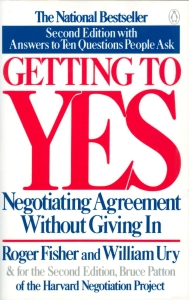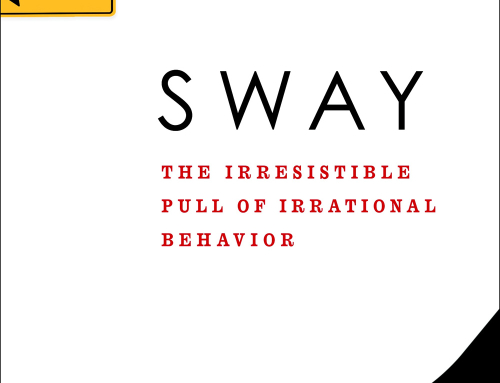Project Description
Subtitle: Negotiating Agreement Without Giving In
By: Roger Fisher and William Ury
Notes:
- Don’t bargain over positions.
- Example: haggling.
- Wise agreement: durable, fair, takes community interest.
- Positioning bargaining fails to meet wise agreements.
- Tend to lock themselves into positions.
- It’s inefficient.
- The more extreme the opening positions, the longer it takes.
- More difficult when more are involved.
- Soft positional bargaining is preferred, but gets overwhelmed by hard bargaining.
- Four principles:
- People: separate ppl from negotiation.
- Interest:
- Options: invent options for mutual gain.
- Criteria: use objective criteria.
- Separate ppl from negotiations.
- Empathy is the most important skill a negotiator can have.
- Make sure the person is a part of the bargaining process. Both need to feel ownership of the solution. (ex: Israel v. Palestine)
- Face saving is important.
- Make emotions explicit and acknowledge them.
- Allow the other side to let off steam.
- Let them speak until they are done.
- Don’t react to emotional outburst.
- An apology might be effective too.
- Communication:
- Listen actively and acknowledge.
- Try to explain it back to them from their perspective.
- Important agreements are usually made when only 2 ppl are in a room.
- Get to know the advisories likes and dislikes.
- Ben Franklin would borrow a book from the advisory so it made the person more comfortable that Ben owed them a favor.
- Listen actively and acknowledge.
- Look at interest (define the problem), not positions.
- Technique: put yourself in their shoes and ask why they have that position.
- Watch for basic human needs (money is not the only need).
- Acknowledge their interest. Acknowledge shared interest.
- Put problem before your answer.
- Don’t say the position and then explain why.
- Be soft on the person and hard on the problem.
- Could also increase the creativity of both sides.
- Combine support for the person and attack the problem with same vigor. Firm and open leads to success.
- People dislike inconsistency, so they work to fix it.
- Invent options for mutual gain.
- Even if you win, the other person might be mad, so you didn’t actual win.
- These things make it difficult:
- Premature judgment
- Belief in a fixed pie: might find agreement that works for both sides.
- One solution: may hurt your ability to be creative.
- No empathy
- To create a brainstorming session:
- Choose facilitator
- Make the location very different than normal.
- Seat ppl side by side; don’t face each other.
- Clarify ground rules.
- Record the ideas in full view.
- Options invite other options.
- These things make it difficult:
- Make shared interest explicit.
- Risk could be traded for revenue.
- Could make a few options that suit you and then ask if they like any of them.
- Helps to get to a mutual gain.
- Could do a one cuts and the other chooses.
- Could get a third party opinion.
- Ask for the theory behind a particular price. Why is that price important.
- Even if you win, the other person might be mad, so you didn’t actual win.
- BATNA (best alternative to a negotiated agreement)
- Try to understand what they would have to go through in order to full fill the order. Maybe the alternative price can raise the value of your offer so that the exchange is fair.
- Having a bottom line is almost certain to be too rigid.
- It limits creativity and other options.
- It’s worth disclosing the BATNA when you have a big advantage.
- If you are outmatched, then negotiate on merit.
- Negotiation Jujitsu.
- If attacked, you attack back, unfortunately, this just locks people into their roles. Do not push back.
- Don’t defend your ideas. Just sidestep.
- Explore options and interest for mutual gain.
- Recast an attack on you to an attack on the problem.
- Use silence to your advantage.
- When you ask questions, pause. It’s extremely effective.
- The other side will want to break the silence.
- When you ask questions, pause. It’s extremely effective.
- If attacked, you attack back, unfortunately, this just locks people into their roles. Do not push back.
- Principle negotiation: state the facts.
- Leaves the conversation open to correction and persuasion.
- Helps negotiation to start off without confrontation.
- Helps build trust bt members.
- Whenever possible, ask question:
- “Can I ask a few questions to make sure the facts are rights?”
- Allows them to participate.
- “Can I ask a few questions to make sure the facts are rights?”
- Offer all reasons first, then state your position.
- Leaves the conversation open to correction and persuasion.
- Taming the hard bargainer.
- Negotiate about the rules of the game. Negotiate about the tactics.
- Question the tactic, not their integrity.
- Counter Deception:
- Phony facts:
- Ambiguous authority: ask for someone with more authority.
- Never resort to threats.
- Must be credibly communicated.
- Extreme demands: Just gambles. Not good to start with.
- Works better when you lose control.
- Comfort the other side with a firm choice if u need to conclude them.
- Take it or leave it works.
- Good faith rule.
- If the transcript was published, would u be upset?
- Even if u get something that is way in your favor, you may not want to take it, because u might be missing something or they could later conclude that something is unfair and not follow through.
- No value in a super fair tentative agreement.
- A reputation for fairness helps with other contracts.
- Negotiate with terrorist? Yes.
- The better the communication the better ur chance at success.
- When not to negotiate?
- When ur Batna is good. When u have a bad Batna, then negotiate for a better deal.
- How what is too high or where to meet or who makes the first offer needs an understanding of the person in order to figure out a good price.
- First offer requires more research.
- The more u try for the more u will likely get.
- Aspiration helps!
- Increase negotiation power?
- Have a good Batna,
- Power of commitment helps.
- Good communication.
- Cooperative relationship.
- A written offer can have more power than a verbal offer. Simplifies things.
- Empathy is the most important skill a negotiator can have.





Leave A Comment